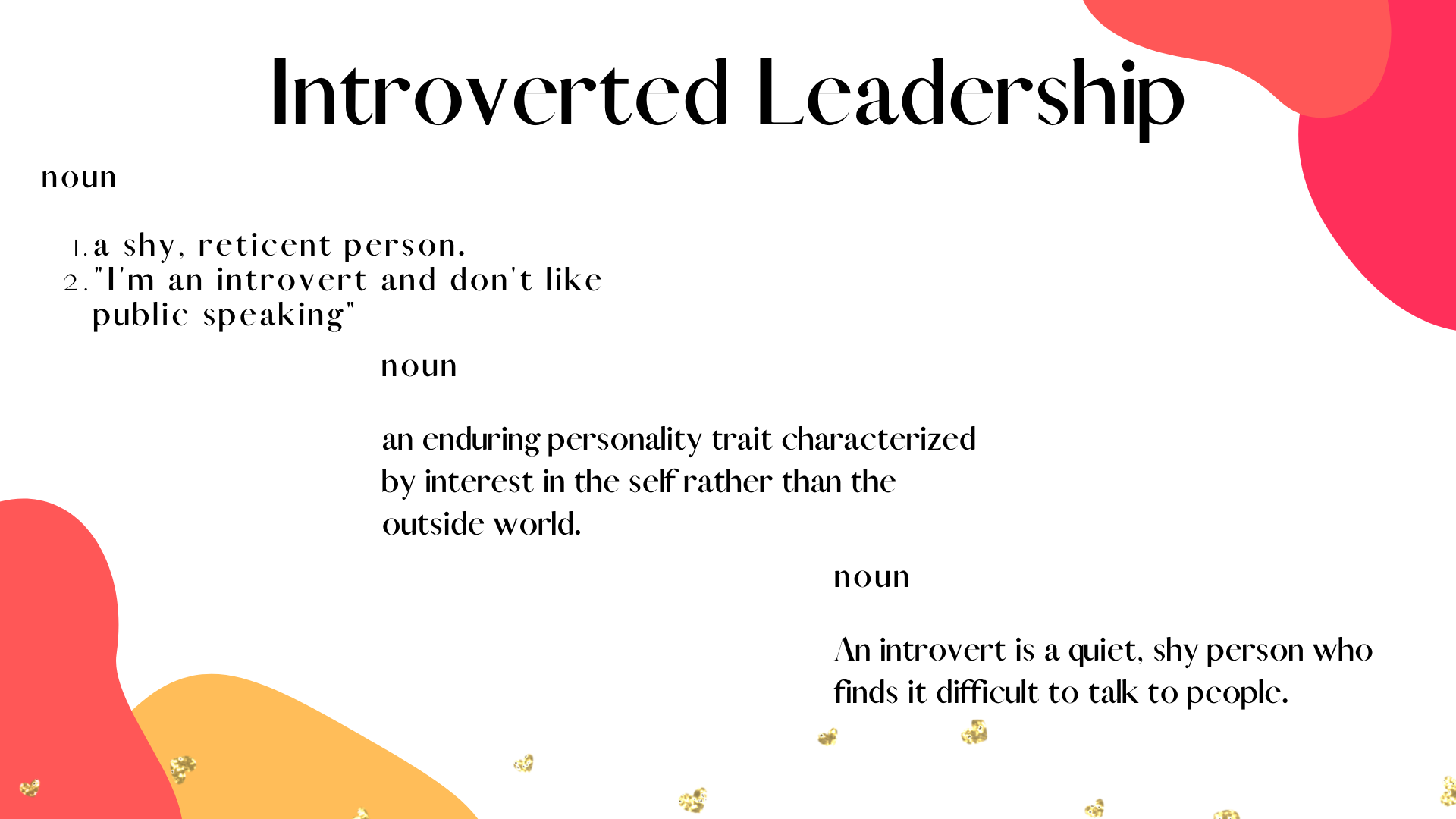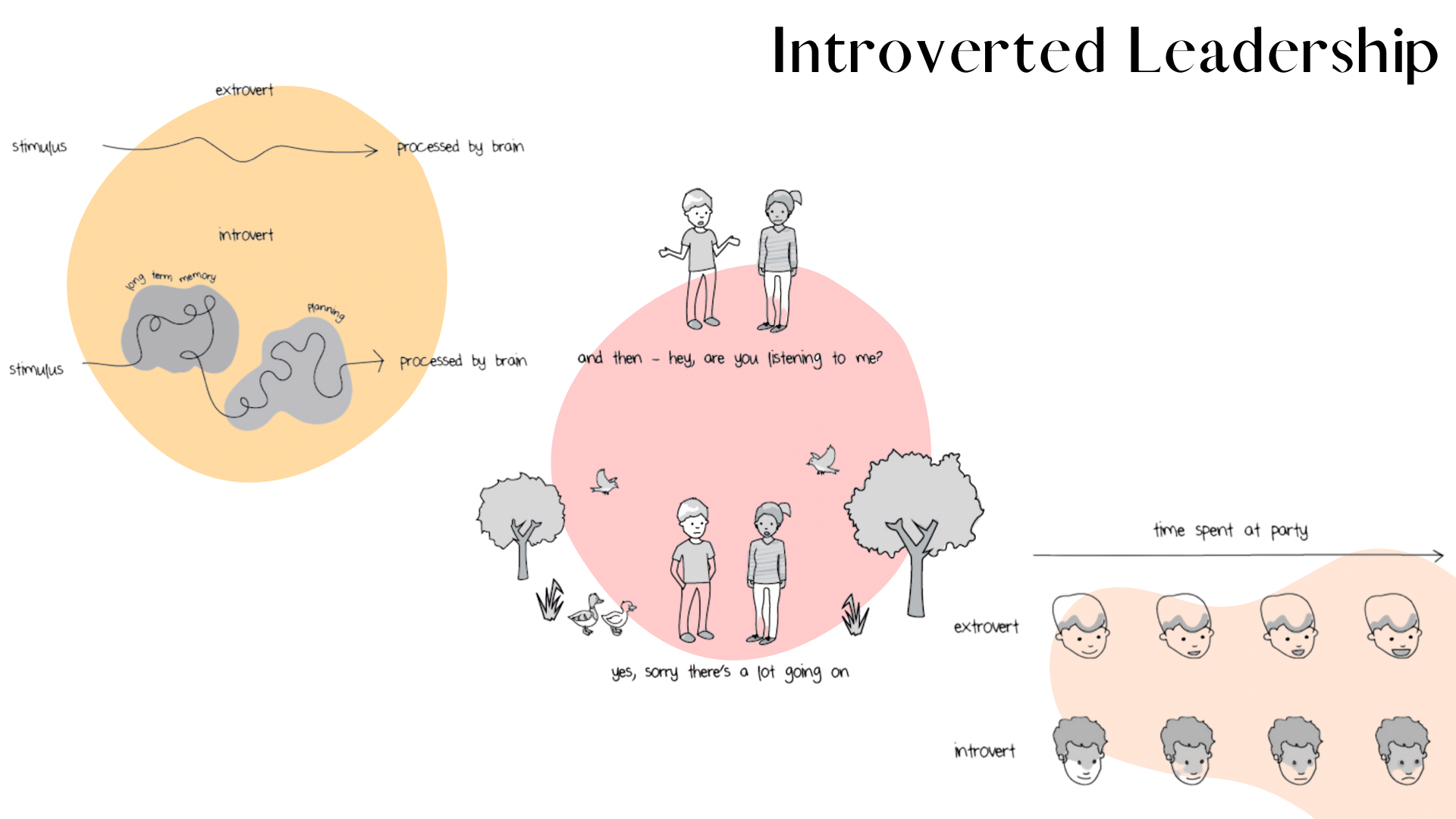Introverted Leadership

What do you think of these dictionary definitions of what it means to be introverted? Finding a sufficiently reasonable definition for what introversion is a challenge in itself. No wonder there is a stigma around being introverted with all these negative and demeaning definitions!
In many societies, there is a very narrow view of this personality type. This leads to assumptions about what introverts are capable of; these limiting definitions can encourage negative perceptions about an introvert’s competence and confidence as a leader, particularly in a world which is more often geared up towards more extroverted personality types.
Often, there’s an emphasis on ‘overcoming’ introversion and the need to learn skills to be more extroverted in order to survive in a forward-facing environment. I strongly disagree with this, and am fascinated by the research around introversion and on the narratives of those who, like me, own their introversion and are able to thrive authentically in leadership roles.
Unlike the definitions above, which focus on personality traits (shy, quiet etc) I believe that whether you're an introvert or an extrovert all depends on how you process and interact in the world around you; where you naturally derive your energy from and where you prefer to spend your energy.
We know that the brains of the two personality types, introverts and extroverts, work a little differently from each other. Introvert brains react differently to dopamine than extrovert brains do. (Dopamine is a chemical that turns on the reward- and pleasure-seeking part of your brain.) Introverts and extroverts have the same amount of the chemical, but extrovert brains get an excited buzz from their reward center. Introverts, on the other hand, tend to just feel run-down by it.
Also, introverts have a longer neural pathway for processing stimuli. In other words, it’s more complicated for introverts to process interactions and events, as we attending to personal thoughts and feelings at the same time.Introverts process everything in their surroundings and pay attention to all the sensory details in the environment, not just the people. This can mean that introverts are more easily over-stimulated.

As well as being introverted, I’m also what’s classed as a hyper sensitive person, which means that strong smells, bright lights, loud sounds can affect (ok, irritate) me in a way that most other people wouldn’t even notice. Not all introverts are sensitive in this way, but it’s worth noting that many are!
So, what does this tell us?
It’s likely that introverts may become energetically depleted from some of the more forward-facing aspects of being a leader, for example, conferences, public speaking and networking.
Now, this isn’t to say that introverts aren’t good at these aspects of leadership. Not at all. It’s telling us that introverts may need alternative environments to thrive in, and that there needs to be carefully planned prep and decompression time in their working day in order to process, lead well, feel well and generally work to the best of their ability. A consideration for the working environment, frequency of outward facing events, and levels of noise and interaction with others should come into consideration.
I thrive on the more intimate side of leadership; the relationships, the quality of the processes, products and interactions, the connection, the community communication. That’s not to say I’m not good at the forward-facing stuff though, because I am! I deliver workshops, peer support and even keynotes. I’m increasingly more confident with public speaking and I’m rooted in being my authentic self when I do. I don’t pretend to be someone else who is more extroverted (a common strategy employed by many introverts - becoming an alter-ego in order to appear more confident). Being introverted doesn’t hold me back, but it does mean I need to have a high level of self-awareness, awareness of my environment and the confidence to articulate any boundaries, expectations and sometimes support which I need in order to thrive, as opposed to just surviving the events.
Here are three questions to consider if you are an introverted leader, or are working with introverted leaders.
How can we ensure introverted leaders thrive?
Consider alternative ways to collate thoughts and ideas from introverts. Give them time to process. Don’t rush them, put them on the spot, or expect them to answer immediately if you want meaningful responses.
Don’t expect introverts to thrive if you’re asking them to pitch and present when there are alternative ways of communicating. Expecting people to perform in a way that doesn’t suit them or allow them to thrive isn’t going to get the best of out of them
How can we show up as authentic, introverted leaders?
Recognise your strengths in leadership. Consider how you can best utilise those skills and abilities to serve others/your community. Don’t feel pressured: own your authenticity.
Plan in prep time and down-time leading up to and following energy depleting events. Ensure the time is scheduled into your diary.
Be confident in articulating what it is that you need to the people that you’re working with. If it doesn’t work for you, say so, and work to find an alternative.
Are the systems and environments that we work in inclusive for introverted leaders?
Processing additional sensory stimuli can deplete your energy levels rapidly. If you have an open plan office where you can constantly hear your colleagues, ensure you take regular breaks.
Consider wearing noise reducing ear plugs to help with focus (I highly recommend Loops.)
If you have an open door culture, ensure you have boundaries in place to ensure that you are not constantly interrupted when you’re in the flow of working.
